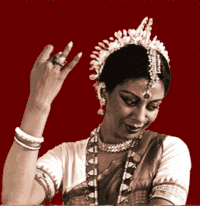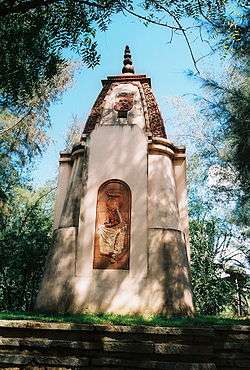Protima Bedi
Protima Gauri Bedi[2][3] (12 October 1948 – 18 August 1998)[4] was an Indian model turned Odissi exponent. In 1990, she established "Nrityagram", a dance village near Bangalore.
Protima Bedi | |
|---|---|
 | |
| Born | Protima Gupta[1] 12 October 1948 Delhi, India |
| Died | 18 August 1998 (aged 49) Malpa, Pithoragarh, India |
| Nationality | Indian |
| Occupation | |
| Spouse(s) | |
| Children | 2, including Pooja Bedi |
| Website | www |
Early life
Protima was born in Delhi,[5] the second of the four siblings, three daughters and a son. Her father Laxmichand Gupta, a trader belonging to a business family from Karnal district, Haryana, and her mother Reba, a Bengali. Her father had to leave home, because of opposition to his marriage,[1] Thereafter, he started working in Delhi.
In 1953, her family moved to Goa, and in 1957 to Bombay. At age nine, she was sent to stay at her aunt's, in a village in Karnal district for a while, where she studied in a local school. On her return, she was sent to Kimmins High School, Panchgani, where she received her early education. She graduated from St. Xavier's College, Bombay (1965–67).[5]
Career
Modeling career
By the late 1960s, she was a prominent model. In 1974, she came into the news for streaking during the daytime for the launch of the Bollywood magazine, Cineblitz at Juhu Beach in Bombay.[6]
Dance career
You have only to ready yourself, to allow things to happen as they should. The greatest favour you can do yourself is to 'get out of your own way'.
- Protima Bedi, Timepass: Memoirs of Protima Bedi[5]
In August 1975, at the age of 26, an Odissi dance recital [7] completely changed her life when she ran into the Bhulabhai Memorial Institute by chance, and saw two young dancers giving an Odissi performance. It filled her with a kind of passion she'd never known before, in spite of its extremely complex rhythms, patterns and sophisticated hand-and-eye gestures. She became a student of Guru Kelucharan Mohapatra from whom she learnt the art of dancing for 12 to 14 hours a day and faced a lot of hardship as a beginner. She transformed herself from being the tight trouser, halter neck, off-shoulder girl with gold streaked hair to Protima Gauri, later as Gauri Amma or Gauri Maa, as she was affectionately known amongst her students.[8]
To her dance was a way of life. She proved to be an excellent learner. To perfect her dance, she started studying abhinaya from Guru Kalanidhi Narayan of Madras. From then on, she started giving performances all over the country. Around the same time, Protima started her own dance school at Prithvi Theatre in Juhu, Mumbai. It later became the Odissi Dance Centre. After her separation from Kabir Bedi in 1978, she was looking for an anchor and she found it in her dance.
Nrityagram

Nrityagram, situated on the outskirts of Bangalore, became India's first free dance gurukul,[9] village for various Indian classical dances, consisting of seven gurukuls for the seven classical dance styles and two martial arts forms, Chhau and Kalaripayattu.[10] She wanted to revive the guru-shishya parampara in the right kind of environment. Nrityagram was inaugurated on 11 May 1990, by the then Prime Minister, V.P. Singh. The dance school has a small community of students from all parts of India, but with a common aim - dance. The Nrityagram ensemble was soon performing all over the world.[11] Meanwhile, in 1992, she appeared in Pamela Rooks's English film, Miss Beatty's Children .[12]
Nrityagram, created as a model dance village, was constructed by master architect, Gerard da Cunha. It had even won the Best Rural Architecture' award in 1991. To raise funds to run Nrityagram, a tourist resort Kuteeram was built in 1992. Nrityagram is also the venue of the annual dance festival Vasanta Habba, which was first started in 1994 and had 40,000 visitors when it was last held in 2004. It has not been held from 2005–2007, due to the advent of the 2004 tsunami and a shortage of funds.[13]
Final years
Protima's son Siddarth who was suffering from schizophrenia, committed suicide in July 1997, while he was studying in North Carolina,[14] this changed the course of her life irrevocably, as in early 1998, she announced her retirement and changed her name to Protima Gauri,[1] soon she started travelling in the Himalayan region, starting with Leh.[15] In a newspaper interview given in April, 1997, camping at Rishikesh during the Kumbh Mela, she said, "I have decided to give myself up to the Himalayas. It is the call of the mountains which has beckoned me to them. And who knows what may come out of it? It is bound to be something good," [16] Subsequently, in August, Protima Gauri set off on her pilgrimage to Kailash Mansarovar and it was there that she disappeared after the Malpa landslide, near Pithoragarh,[17] in the Himalayas, leaving behind her most lasting achievement — a flourishing dance village, Nrityagram, where students continue to learn the classical dance styles of India. Her remains and belongings were later recovered after several days along with seven other bodies as remains of a landslide in Malpa, a village near the India-Nepal border.
In her autobiography, Timepass, based on her journals and letters, collated and published by her daughter, Pooja Bedi in 2000, she gives a candid account of all her relationships, her rebellious lifestyle, her family life, the birth of her dream project, Nrityagram, and her eventual transition into a sanyasin, towards the end of her life, when she retired from public life and wanted to explore the Himalayas.[18]
Personal life
Protima Bedi, during her modelling days, met Kabir Bedi. And after a few months, she walked out of her parents' house to live with him. It was another indication of her expression of individuality, which continued throughout her life. She married Kabir and had two children - Pooja Bedi and Siddharth Bedi.
See also
- Indian women in dance
Notes
- This Above All - She had a lust for life The Tribune, 5 February 2000.
- Obituary Archived 2 August 2009 at the Wayback Machine India Today, 7 September 1998.
- Protima Gauri Bedi nrityagram.org.
- Dream Nrityagram.
- Time Pass: The Memoirs of Protima Bedi, Introduction, pp. 1–2. Biographical info: "Early Years"
- Protima's interview on naked run Archived 2006-03-06 at the Wayback Machine Hindustan Times.
- Protima Guari Interview Rediff.com, 22 August 1998.
- Bina Ramani Mourns... Indian Express, 22 September 1998.
- Nityagram profile Archived 16 May 2008 at the Wayback Machine indoindians.com.
- Odissi Kala Kendra Contemporaries in Odissi.
- Dance in Review New York Times, 22 June 1996.
- Protima Bedi on IMDb
- "Waiting for spring". The Hindu. 5 March 2007.
- Interview Kabir Bedi Archived 2009-06-26 at the Wayback Machine Filmfare October, 2001.
- Bowing Out Archived 7 October 2010 at the Wayback Machine India Today, 27 April 1998.
- Dutt, Nirupama (20 August 1998). "Will a pilgrim's tale remain untold?". Indian Express.
- Obituary New York Times, 30 August 1998.
- To Family and friends Archived 2008-10-22 at the Wayback Machine Hindustan Times.
References
- Time Pass: The Memoirs of Protima Bedi, with Pooja Bedi Ebrahim. New Delhi, Penguin, 2000. ISBN 0-14-028880-5.
External links
| Wikimedia Commons has media related to Protima Bedi. |